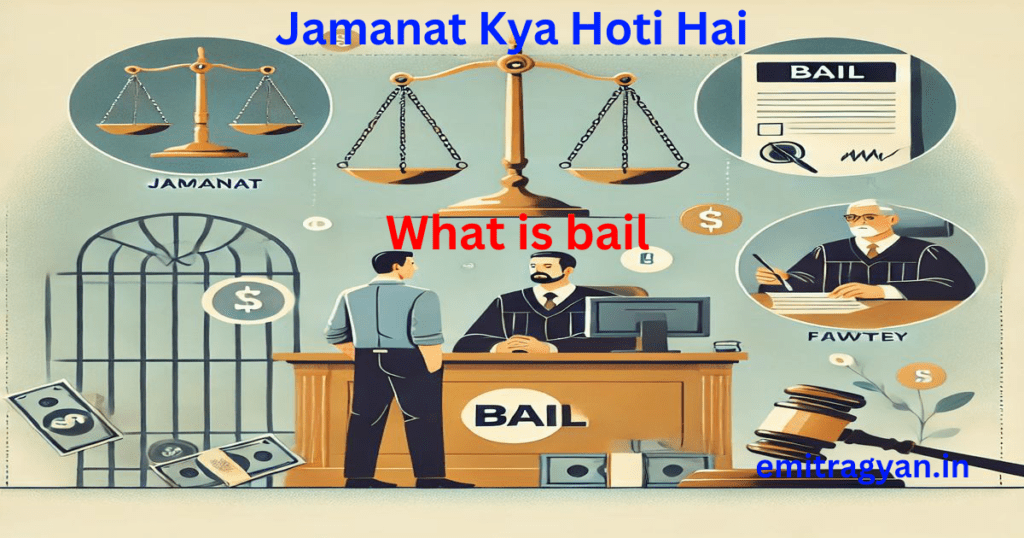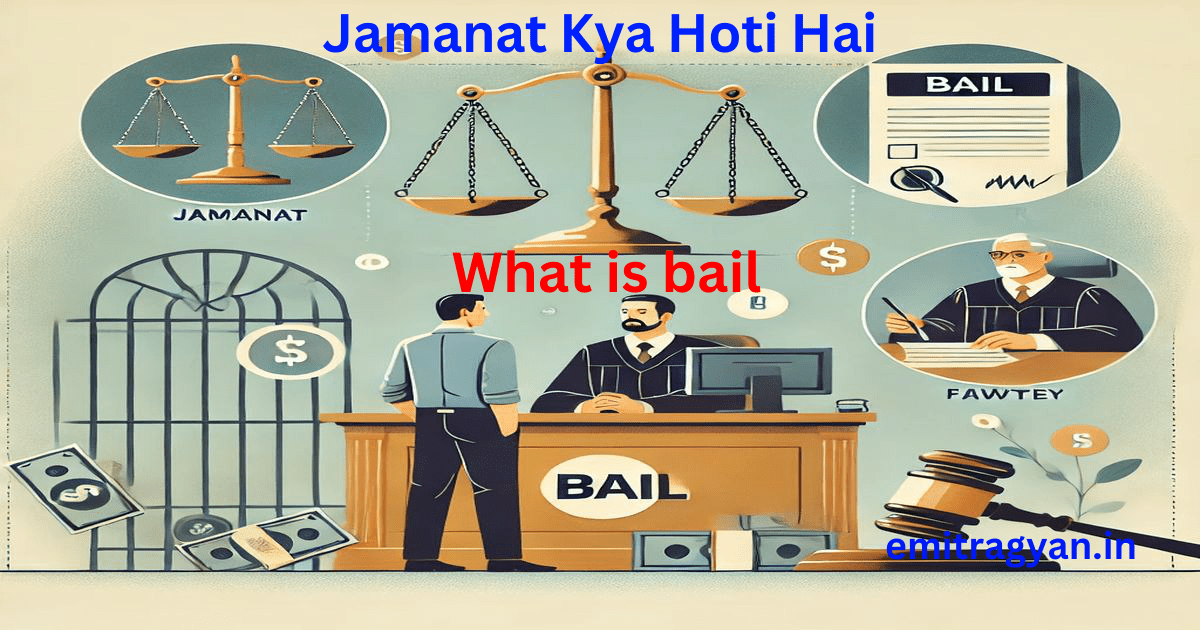Dear readers, today through this post we will learn about Jamanat Kya Hoti Hai in detail. In India, a person detained on charges of crime has a legal right, which allows him to stay out of jail temporarily. It is called bail. In Indian law, it has been made permanent through many sections, and its purpose is to keep the accused free or independent before the hearing. So that he can arrange for his defence and maintain faith in the law. So that he can be proved innocent before the law. Through this post today we will study in detail about Jamanat Kya Hoti Hai, the provision, process, types, rules and related sections of bail step by step.

Jamanat Kya Hoti Hai | What is bail?
In India, a person detained for a crime has a legal right that allows him to stay out of jail temporarily. It is called bail. In Indian law, it has been made permanent through many sections, and its purpose is to keep the accused free or independent before the trial. So that he can arrange for his defence and maintain faith in the law. So that he can be proven innocent before the law. And the law can be convinced that the allegations made against the accused are wrong and the accused is innocent.
Read this also :-
BBMP Property Tax Exposed: What They Don’t Want You to Know
Know the shocking facts about the first information report, how is an FIR registered
Get Your Money Back Today: The Ultimate Guide to Money Recovery Legal Notices
The Shocking Truth About Medical Law and Ethics: Are You Really Protected
Everything You Didn’t Know About Court Marriages: Documents, Process & More
Importance and purpose of bail
In Indian law, every person is considered innocent until proof of his guilt is found. This right is the basis of the Indian Constitution and the judicial system. The judicial system believes that every accused should have the full right to present his case in the court, and he should get the right to temporary freedom until any charge is proven against the accused. That is why the provision of bail has been made in the law so that the accused can prepare for his defence from the law and the accused’s faith in the law remains intact.
types of bail and related sections
Under the Indian Code of Criminal Procedure (CrPC), bail is mainly divided into three types. Which are as follows:-
General Bail
The provision of general bail in India is considered under Section 436 and 437 of CrPC. This bail is given in a situation when a person is arrested by the police and kept in jail. Usually, this bail is given to the accused for less serious crimes.
Section 436: Under this section, the accused gets bail for ordinary crime from police custody. There is also a provision of bail amount in this process. Which is given by the accused to ensure his presence.
Section 437: Under this section, the court can decide bail in serious crimes. If the court feels that the chances of the charges against the accused being proved are less and there is no possibility of the accused absconding. In that situation, the bail of the accused can be granted by the court.
Anticipatory Bail
In India, there is a provision of anticipatory bail in the law under section 438 of CrPC. This bail is taken in a situation when the person fears arrest. It can be taken then. The purpose of anticipatory bail is to get protection from the court before a person is arrested.
Section 438: Under this section, any person who fears that he may be arrested by implicating him in any case, in that situation, that person can apply for this bail and can take his anticipatory bail. The main purpose of this section is to prevent an innocent person from going to jail unnecessarily.
Interim Bail
In India, interim bail is a temporary relief given to the accused, which is given until the final decision on the regular or anticipatory bail of the accused is taken. This bail can be given at any time. And when the court feels that the temporary freedom of the accused is necessary. In that situation, this bail is approved by the court.
Bail Process – From Application to Approval
The process of bail for the accused in India is not easy. Under this process, it is important for the accused to follow the proper legal process in the court. And there are the following steps under this process. Which are as follows:-
Bail application
The accused has to apply to the court for his bail. In this, through the application form, the court has to ensure that the accused will follow the judicial process and follow the orders of the court if he gets bail.
Bail amount and conditions
Upon getting bail, the court can demand a bail amount from the accused. The purpose of this amount is to ensure the presence of the accused in the court. Also, the court can ask the accused to present a surety, who can take responsibility for his non-appearance in the court.
Acceptance or rejection of bail
Under Section 437, the court decides on bail by looking at the nature of the case of the accused, his status, and previous criminal record. If the court feels that the accused will not influence the judicial process after getting bail and there is no danger of him absconding, in that situation the accused is granted bail. But if the court feels that the accused is on the contrary, in serious cases where there is a suspicion of the accused tampering with evidence or pressurizing witnesses, then bail can also be denied by the court.
Reasons for not getting bail
There can be many reasons for the court to deny bail, some of the main reasons are as follows:-
- Serious crime: This crime is the crime under which the possibility of getting bail is very less in crimes like murder, rape and terrorism. Especially when the accused already has a criminal record in the court.
- Danger of tampering with evidence: If the court feels that the accused can tamper with the evidence or put pressure on the witnesses, then in this situation bail is not granted by the court.
- Possibility of absconding: If the court suspects that the accused can run away or it may be difficult to catch him, then in this situation the bail of the accused can be rejected by the court.
Conclusion:
The provision of bail is an important part of the Indian judicial system which helps in maintaining the fairness and transparency of justice. This process ensures that the accused gets the freedom to defend himself until the proof of his guilt is found by the court. The provision of bail not only helps in maintaining the principle of justice, but it also ensures that an innocent person does not have to remain in jail unnecessarily.
Knowledge of sections 436, 437, and 438 is very important to understand bail and using them correctly is a part of importance for both the court and the accused.
FAQ :-
What is bail, and what is its purpose?
Bail is a legal process in which any accused is allowed by the court to stay out of jail temporarily. While the condition is that he will follow the orders of the court. Its purpose is to give the accused an opportunity to defend himself. But the judicial process continues.
What is anticipatory bail, and when is it granted?
The provision of anticipatory bail is given under section 438. If a person fears arrest and feels that he can be arrested by making false allegations against him, then he can apply for anticipatory bail. This bail provides protection to the accused before arrest.
When is interim bail granted?
Interim bail is a temporary relief which is given till the final decision on regular or anticipatory bail is taken. It is usually given when the court feels that it is necessary to release the accused for some time.
Does the case end after getting bail?
The case does not end even after getting bail. The case continues on the accused. Bail is only a temporary freedom. In the case, if the accused is proved innocent by the court, the case ends.

1 thought on “Jamanat Kya Hoti Hai, What is bail, its types, rules, procedure and documents”